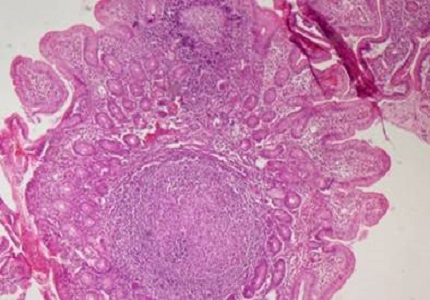Nodular lymphoid hyperplasia: A thin grey zone between hyperplasia and Pathological aggregate
Abstract
Introduction: The clinical-pathological characteristics of 12 patients with intestinal nodular lymphoid hyperplasia (NLH) are described with the aim to try and delineate between hyperplasia and pathological aggregate of lymphoid tissue in the intestine and its association with other diseases from Indian subcontinent.
Materials and Method: 12 diagnosed cases of NLH were retrieved out of 2256 intestinal punch biopsy done at our centre and were evaluated as per histological criteria laid down by various authors including their clinical and pathological features.
Results: Most frequent symptom includes diarrhoea and weight loss and the severity of these symptoms were directly proportional to the number and location of the lymphoid nodules. Prominent lymphoid nodules in mucosa and/or submucosa were documented histologically in all cases. One patient had associated common variable immunodeficiency which on follow up developed intestinal lymphoid malignancy of NHL type (DLBCL) and the other was having hypogammaglobulinemia. All cases showed absence of plasma cells, except one with predominant symptoms of Gastro-esophageal reflux disease (GERD) rather than diarrhea.
Conclusion: NLH runs as a benign course, but these cases should be followed up with histology as well as thorough clinical and biochemical evaluation to detect early lymphoma that can be managed efficiently.
Downloads
References
2. Ranchod M, Lewin KJ, Dorfman RF. Lymphoid hyperplasia of the gastrointestinal tract. A study of 26 cases and review of the literature. Am J Surg Pathol. 1978 Dec;2(4):383-400. [PubMed]
3. Case records of the Massachusetts General Hospital. Weekly clinicopathological exercises. Case 8-1997. A 65-year-old man with recurrent abdominal pain for five years. N Engl J Med. 1997 Mar 13;336(11):786-93. DOI: 10.1056/NEJM199703133361108.
4. Levendoglu H, Rosen Y. Nodular lymphoid hyperplasia of gut in HIV infection. Am J Gastroenterol. 1992 Sep;87(9):1200-2. [PubMed]
5. Jonsson OT, Birgisson S, Reykdal S. Resolution of nodular lymphoid hyperplasia of the gastrointestinal tract following chemotherapy for extraintestinal lymphoma. Dig Dis Sci 2002; 47: 2463-2465.
6. Ward EM, Wolfsen HC. Review article: the non-inherited gastrointestinal polyposis syndromes. Aliment Pharmacol Ther 2002; 16: 333-342 [PMID: 11876685 DOI: 10.1046/ j.1365-2036.2002.01172.x]
7. Riddell RH, Petras RE, Williams GT, Sobin LH. Lymphoproliferative disorders of the intestines. In: Riddell RH, Petras RE, Williams GT, Sobin LH, eds. Tumors of the Intestines. Washington, DC: Armed Forces Institute of Pathology; 2003: 395–430. Atlas of Tumor Pathology; 3rd series, fascicle 32.
8. Alberto Rubio-Tapia, Jorge Hernández-Calleros, Sagrario Trinidad-Hernández, Luis Uscanga. Clinical characteristics of a group of adults with nodular lymphoid hyperplasia: A single center experience. World J Gastroenterol 2006 March 28; 12(12): 1945-1948.
9. Hermans PE, Diaz-Buxo JA, Stobo JD. Idiopathic late-onset immunoglobulin deficiency. Clinical observations in 50 patients. Am J Med. 1976 Aug;61(2):221-37. [PubMed]
10. de Weerth A, Gocht A, Seewald S, Brand B, van Lunzen J, Seitz U, Thonke F, Fritscher-Ravens A, Soehendra N. Duodenal nodular lymphoid hyperplasia caused by giardiasis infection in a patient who is immunodeficient. Gastrointest Endosc 2002; 55: 605-607 [PMID: 11923787 DOI: 10.1067/ mge.2002.120786]
11. Khuroo MS, Khuroo NS, Khuroo MS. Diffuse duodenal nodular lymphoid hyperplasia: a large cohort of patients etiologically related to Helicobacter pylori infection. BMC Gastroenterol 2011; 11: 36 [PMID: 21481240 DOI: 10.1186/1471-230X- 11-36]
12. Misra SP, Misra V, Dwivedi M, Singh PA. Helicobacter pylori-induced lymphonodular hyperplasia: a new cause of gastric outlet obstruction. J Gastroenterol Hepatol 1998; 13: 1191-1194 [PMID: 9918424 DOI: 10.1111/j.1440-1746.1998. tb00603.x]
13. Andreia Albuquerque Nodular lymphoid hyperplasia in the gastrointestinal tract in adult patients: A review World J Gastrointest Endosc 2014 November 16; 6(11): 534-540.
14. Cooper MD, Schoerder HW. Primary immune deficiency diseases. In: Kasper DL, ed. Harrison´s Principles of Internal Medicine, 16th ed. McGraw-Hill, 2005: 1939-1947.
15. Matuchansky C, Touchard G, Lemaire M, Babin P, Demeocq F, Fonck Y, Meyer M, Preud'Homme JL. Malignant lymphoma of the small bowel associated with diffuse nodular lymphoid hyperplasia. N Engl J Med. 1985 Jul 18;313(3):166-71. DOI: 10.1056/NEJM198507183130307.
16. Rubio CA. Nonprotruding colorectal neoplasms: epidemiologic viewpoint. World J Surg. 2000 Sep;24(9):1098-103. DOI: 10.1007/s002680010147. [PubMed]
17. Rambaud JC, De Saint-Louvent P, Marti R, Galian A, Mason DY, Wassef M, Licht H, Valleur P, Bernier JJ. Diffuse follicular lymphoid hyperplasia of the small intestine without primary immunoglobulin deficiency. Am J Med 1982; 73: 125-132 [PMID: 7091167 DOI: 10.1016/0002-9343(82)90938-X]
18. Monsanto P, Lérias C, Almeida N, Lopes S, Cabral JE, Figueiredo P, Silva M, Julião M, Gouveia H, Sofia C. Intestinal nodular lymphoid hyperplasia and extraintestinal lymphoma--a rare association. Acta Gastroenterol Belg. 2012 Jun;75(2):260-2.
19. Matuchansky C, Touchard G, Lemaire M, Babin P, Demeocq F, Fonck Y, Meyer M, Preud'Homme JL. Malignant lymphoma of the small bowel associated with diffuse nodular lymphoid hyperplasia. N Engl J Med. 1985 Jul 18;313(3):166-71. DOI: 10.1056/NEJM198507183130307.



 OAI - Open Archives Initiative
OAI - Open Archives Initiative


